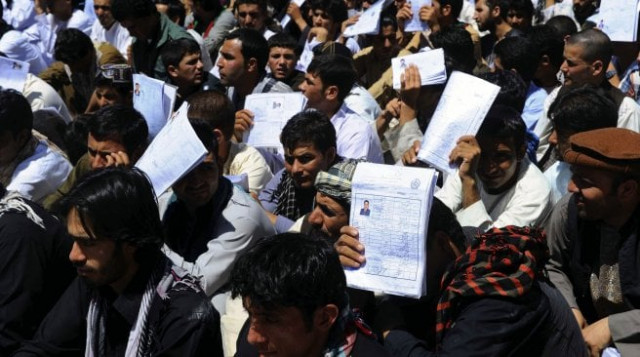When the Durand fails to divide: Afghan nationals continue to pour in illegally
Data from the past three days shows more than 14,000 Afghans entered Pakistan via Torkham.

These numbers were gathered by the police at Torkham border for Tuesday, Wednesday and Thursday. Around 14,274 Afghan nationals crossed into Pakistan via Torkham and the Khyber Pass, while around 16,683 went to Afghanistan. On Thursday alone, around 3,708 Afghan nationals entered Pakistan, of which 3,548 did so illegally. Only 160 of these thousands of Afghans were carrying their travel documents with them.

In comparison, only a handful of Pakistani nationals, around 30 to 40, go to Afghanistan via Torkham border every day. Moreover, all of them do so after acquiring visas from the Afghan embassy in Pakistan.
There are several entry and exit points along the ‘porous’ Pak-Afghan border that runs along hundreds of miles. It has been used for transportation for thousands of years, with no record of how many people use the route to enter Pakistan from the neighbouring country on any given day or month.
Torkham, unsurprisingly, is the most favoured route because of how easy it is to get a ride along this ancient course.
"We are not policymakers, we only implement [the policies] and these [Afghan nationals] have been going and coming to Pakistan since 1980 without inviting any attention,” an official of the political administration of Khyber Agency told The Express Tribune. “[The] government’s policy about them is to allow free movement."
However, a police official added that on one hand, they launch frequent crackdowns on refugees living in the country without registration, but on the other hand the federal government is following a policy of free movement. "We talk of closing down all 45 refugee camps in the province as they are considered breeding grounds for criminals and often discuss sending them back by force, but at the same time, we do not really care about how many of them are still entering Pakistan illegally each day.”
The police official said some Afghan refugees have been found to be involved in the recent extortion cases and they were caught using Afghan SIMs too. "They commit crimes like carjacking, murder, robberies, terrorism, kidnapping for ransom and extortion and then go back to their homeland to avoid arrest or detection."
He added that there should be proper documentation for them and their activities should be monitored at all times. "Once they enter Pakistan illegally, they are free to go as far as Karachi. There is no check on their activities."
Published in The Express Tribune, July 12th, 2014.













COMMENTS
Comments are moderated and generally will be posted if they are on-topic and not abusive.
For more information, please see our Comments FAQ